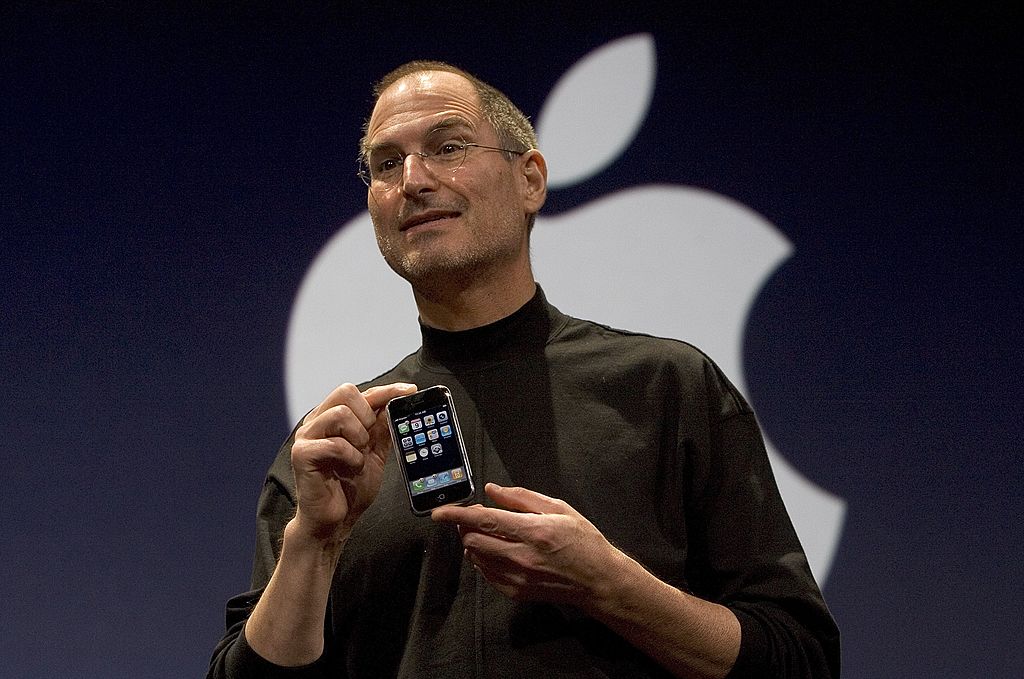Lisa Brennan-Jobs Net Worth: How Much Money Did Steve Jobs’ Daughter Inherit from Her Famous Dad?
In August 2018, Apple officially became the first U.S. company to be worth over $1 trillion. On Thursday, August 2, shares of the tech company closed at $207.39, which pushed its market cap to just above the 13-digit mark.
That’s an impressive achievement, and one that would have made Apple’s co-founder Steve Jobs even richer than he already was, if he’d been around to see it happen. Jobs died of pancreatic cancer in 2011. At the time of his death, he was worth an estimated $10.2 billion.
Who inherited Steve Jobs’ fortune?

Jobs’ wife, Laurene Powell Jobs, inherited her husband’s fortune, mostly shares of Apple and Disney stock. Today, she’s worth $18.8 billion, making her the 58th-richest person in the world and the sixth-richest woman on the planet.
But his widow wasn’t Jobs’ only surviving relative. In addition to the three children he had with his wife, Jobs also had an older daughter, Lisa Brennan-Jobs, who was born in 1978.
Did Steve Jobs’ oldest daughter get any money from her father?
Jobs left his first child a “multi-million dollar inheritance” according to Fortune. Given the vast size of Jobs’ estate, it might seem like he could have been more generous, but given their rocky relationship over the years, she may have been lucky to get anything at all.
Who is Lisa Brennan-Jobs?

Brennan-Jobs had a complicated relationship with her father, as she explains in her new memoir Small Fry, due out September 4.
For years after her birth, Jobs denied that Brennan-Jobs was his daughter. Because he refused to support the child, her mother – Jobs’ on-again, off-again high school girlfriend — was forced to rely on welfare and waitressing jobs to get by. It wasn’t until San Mateo County sued for child-support payments and a DNA test was ordered that Jobs started providing some money to his ex and child. In 1980, he began paying $500 month in child support. He also paid his daughter’s health insurance until she turned 18.
Jobs did play a role in his daughter’s life growing up, but he was often emotionally distant. At one point during her childhood, Jobs told her, “You’re not getting anything. You understand? Nothing. You’re getting nothing.” But she eventually began accompanying him on business trips and lived with him during high school, Business Insider reported. He also paid her tuition at Harvard.
Growing up, Brennan-Jobs struggled to reconcile her modest life with her mother with her father’s extraordinary wealth. “We moved a lot. We rented,” she wrote of her childhood in a 2008 essay for Vogue. “My father was rich and renowned and later, as I got to know him, went on vacations with him, and then lived with him for a few years, I saw another, more glamorous world. The two sides didn’t mix, and I missed one when I had the other.”
Jobs could be mercurial. When Lisa was in college, he would sometimes withdraw financial support after the pair fought, leaving his daughter to scramble to pay her tuition, according to Walter Isaacson’s biography of the man behind Apple.
“For him, I was a blot on a spectacular ascent, as our story did not fit with the narrative of greatness and virtue he might have wanted for himself. My existence ruined his streak,” she writes in her new memoir, excerpted in Vanity Fair.
What about Lisa Brennan-Jobs’ mother?
While Jobs and his oldest child did not always get along, she spent time with him during his final illness and was with him when he died. But her mother, Chrisann Brennan, a painter, never succeeded in patching things up with her ex.
Brennan called her ex “cheap as could be,” according to Fortune. Though he did eventually increase his child support payment to $4,000 a month and paid for things like a house, cars, and Brennan-Jobs’ private school tuition, Brennan filed for bankruptcy in 1996.
In 2005, she wrote Jobs a two-page letter requesting $25 million, plus $5 million for her daughter, to make up for his “dishonorable behavior.” Jobs didn’t reply. A few years later and in poor health, she asked him to set her up with a trust. If he refused, she said she’d move ahead with publishing a book on their relationship. Jobs said, “I don’t react well to blackmail,” and Brennan went on to release her memoir, A Bite in the Apple. In the candid book, she called Jobs a “brilliant misfit” who showed her “that awesome and awful could be but a hair’s breadth apart.”
Check out The Cheat Sheet on Facebook!


